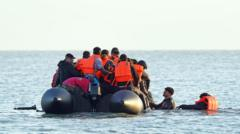PA Media
Germany will tighten its law to make it easier to prosecute those helping to smuggle migrants to the UK, as part of a new plan agreed between the two countries.
Facilitating people-smuggling is not technically illegal in Germany currently, if it is to a third country outside the EU – which, following Brexit, includes the UK.
Under the new agreement, the Home Office says Germany has pledged to make the activity a clear criminal offence.
Home Secretary Yvette Cooper said the “ground-breaking” agreement would help tackle the criminal gangs organising small boat crossings.
The Conservatives said the plan did not “go far enough” and would not provide the deterrent necessary to reduce crossings.
Earlier this year, a five-month long BBC investigation exposed the significant German connection to small boat crossings in the Channel, with people-smugglers operating in the west German city of Essen.
The new joint UK-German agreement comes as the Home Office’s own Border Security Command warns that Channel crossings “are the most dangerous they have ever been”.
Charlie Eastaugh, director of international operations at the command, told the BBC: “We’ve seen tyre inner tubes being used in place of life jackets, it’s extraordinarily dangerous, they are death traps.
“There are fewer boats and fewer engines in supply, we have seized over 450 boats and engines across Europe – and organised crime gangs are taking greater risks.
“We’re seeing increased numbers in these boats because of the disruptive work we have carried out with our law enforcement partners in Europe.”
Miguel Berger, the German ambassador to the UK, said it was already effectively illegal to smuggle people towards the UK as they would have to go through an EU country like France or Belgium.
“If we also cooperate in the countries of transit and origin, I think we can jointly put a lot of pressure on these criminal networks,” he told BBC Radio 4’s Today programm
Read More





